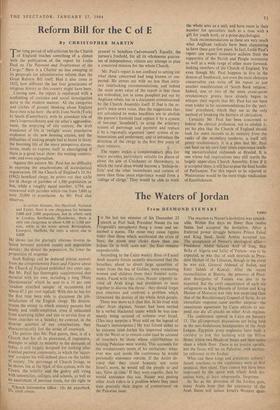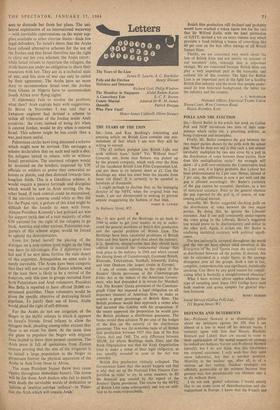The Waters of Jordan
From DESMOND STEWART
CAIRO
N the last ten minutes of his December 23 I speech at Port Said, President Nasser (to use Fitzgerald's metaphors) flung a stone and un- leashed a noose. The stone may cause ripples wider than those which accelerated the crisis of Suez; the noose may choke more than one Sultan. Or in both cases not: the East remains unpredictable.
According to the Cairo weekly Rose el-Yussef Arab security forces recently discovered that the Israelites, about to divert large quantities of water from the Sea of Galilee, were evacuating women and children from their frontier settle- ments. Faced with this crisis, Nasser urgently in- vited all Arab kings and presidents to meet together to discuss this threat: they should forget past rancours and confront a problem which threatened the destiny of the whole Arab people.
There was more to it than this. In his feud with other Arab regimes, Nasser had been nettled by a verbal blackmail under which he was con- stantly being accused of softness over Israel. (This may surprise a West sold on the legend of Nasser's intransigence.) He was forced either to be extreme (and forfeit his improved relations with the West) or to remain calm (and be accused of treachery by those whose cenitributions to helping Palestine were words). This accounts for . the revolutionary terms of his invitation: what- ever was said inside the conference he would perSonally announce outside. If the Arabs de- cided that they could honestly not resist Israel's move, he would tell the people so and say, 'Give us time.' If they were capable, then he would announce this too. Nasser was putting other Arab rulers in a position where they must state precisely their degree of commitment on the Palestine issue. The reaction to Nasser's invitation was remark- able. Within five days no fewer than twelve States had accepted the invitation. After a fraternal power struggle between Prince Feisal and King Saud, Saudi Arabia accepted too. The acceptance of Nasser's ideological allies— Presidents Abdul Salaam Aref of Iraq, Ben Bella of Algeria and Sallal of Yemen—was to be expected, so was that of such neutrals as Presi- dent Shehab of the Lebanon, though in the event he was sick, General Abboud of Sudan, and Emir Sabah of Kuwait. After the recent reconciliation at Bizerta, the presence of Presi- dent Bourguiba of Tunisia was also to be expected. But the swift concurrence of such old antagonists as King Hussein of Jordan and King Hassan of Morocco was only less surprising than that of the Revolutionary Council of Syria. As an immediate response came another surprise—the unanimous agreement by Cairo editors to sus- pend sine die all attacks on other Arab regimes.
The conference opened in Cairo on January 13. The all-important discussions are being held in the neo-Andalusian headquarters of the Arab League. Egyptian army engineers have built a corridor to link this building with the Hilton Hotel, where two Heads of States and their suites share a whole floor. There is no precise agenda, but the focus will be on Palestine, with particu- lar reference to the Jordan.
What can these kings and presidents achieve? Israeli reactions to the 'conference were at first sceptical, then silent. They cannot but have been impressed by the speed with which Arab dis- unities were, at least temporarily, forgotten.
As far as the diversion of the Jordan goes, many Arabs hope that the unanimity of the Arab States will induce Israel's Western spon-
sors to dissuade her from her plans. The uni- lateral exploitation of an international waterway —with inevitable repercussions on the water sup- plies available to other riverine States—finds few legal defenders. To Israel's thesis that the Arabs have refused alternative schemes for the use of the Jordan and that Israel therefore has the right to carry out her own schemes, the Arabs retort: while Israel refuses to repatriate the refugees, the Arab States are under no obligation to share their resources with her. They are in a technical state of war, and this state of war can only be ended by' their agreement. The Arabs have no more duty to accommodate Israel over the Jordan than Ghana or Nigeria have to accommodate South Africa over flying rights.
If diplomacy fails to resolve the problem, what then? Arab capitals buzz with suggestions. In Beirut in November I was told that a Lebanese engineer had devised a scheme to utilise all tributaries of the Jordan. inside /limb countries: the river, instead of being dry when it entered Jordan, would be dry when it entered Israel. This scheme might be less costly than a War, and more useful.
Palestinian circles have long discussed a scheme which might now be revived. This envisages a solemn declaration that on such and such a day, the refugees intend to return, with or without Israeli permission. The unarmed refugees would be mustered on the borders, inspected by UN officials or soldiers to prove they concealed no knives or pistols, and then directed towards their long-lost fields. This is a Gandhian scheme. It would require a passive fortitude and discipline which would be new in Arab striving. On the other hand, if such control could be maintained, if the television cameras could whirr as they did for the Papal visit, a gesture of this kind might be difficult for the Israelis to meet with force. Almost President Kennedy's last political act was his support (with that of a vast majority of other UN nations) for the right of the refugees to go back. America and other nations, Palestinian sup- porters of this scheme argue, would be forced to uphold the demonstrators.
Even for Israel herself the placing of the dialogue on a non-violent level might in the long run have its advantages. For if diplomacy does fail and if no new ideas fertilise the stale desert of this argument, Armageddon on some scale is surely inevitable. The Arabs have been categoric that they will not accept the Zionist scheme, and at the least there is likely to be a revival of the fedayyin, only this time in groups recruited from both Palestinians and Arab volunteers. President Bert Bella is reported to have offered 20,000 ex- .perienced guerrillas. These volunteers would be given the specific objective of destroying Israeli Pipelines. To justify their use of force, Arabs would plead the right of self-defence.
For the Arabs do not see irrigation of the Negev in the idyllic colours in which it appears to Israel's friends. Israel refuses to allow the retugees back, pleading among other excuses that there is no room for them. At the same time she plans to populate the Negev with migrant Jews incited to leave their present countries. The Arab press is full of quotations from Zionist sources proving that the aim of the irrigators is to install a large population in the Negev to perpetuate forever the physical separation of the Arabs in Asia from those in Africa.
The stone President Nasser threw may cause ripples throughout immediate history. The noose will be for those Arab leaders who fail to match with deeds the inevitable words of dedication to V4listin al `arabiya satebqa `aribaya'—to 'Pales- tine the Arab which will remain Arab.'



































 Previous page
Previous page